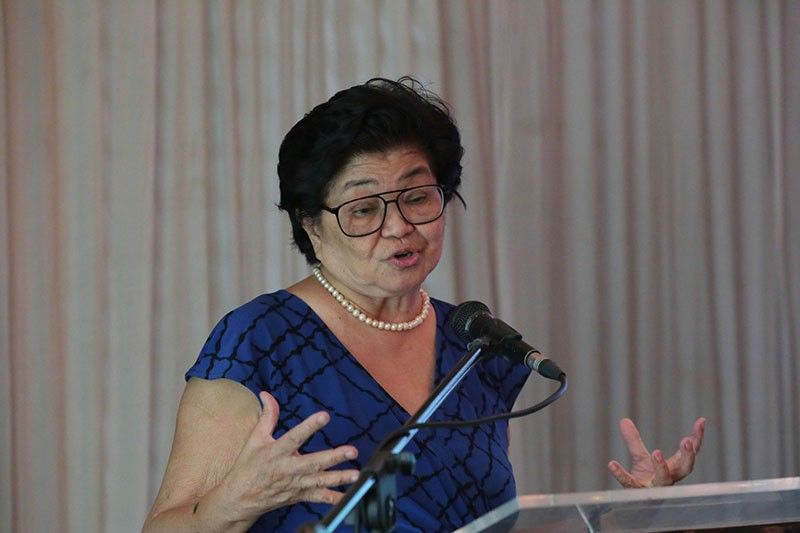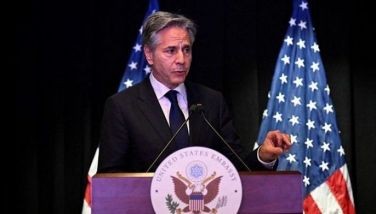Incoming NSA chief on 'unproductive' practice of red-tagging: Let's stop doing that

MANILA, Philippines — Incoming National Security Adviser Clarita Carlos voiced her disapproval Friday of the practice of red-tagging, or conflating progressive critics and activists as armed insurgents, calling it "unproductive."
This comes after incumbent National Security Adviser Hermogenes Esperon, a retired Philippine Army general, launched an offensive against progressive groups and alternative media outfits with just two weeks left in his term. Advocates called this an attack on press freedom and civil liberties.
Speaking over The Mangahas Interviews, Carlos questioned the practice of red-tagging — popularized as of late under the Duterte administration's anti-insurgency campaign — calling it lazy thinking.
"What I will bring into our national security landscape is really my training as a political scientist...when you run out of arguments, you label. It's not a productive thing and it's antithetical to the presumption of innocence, right?… Why are we doing things that are not productive? Let's stop doing that," she said in mixed Filipino and English.
"If you have proof, well then you should file a case in court. Does labeling help you? No, so don't waste your time."
Outgoing Justice Secretary Menardo Guevarra, who has accepted his nomination as the next solicitor general, also said the statement earlier this week. The incoming solicitor general said that "labelling" is dangerous and complaints should be filed instead.
Root cause of insurgency
Carlos said that the national government should address the root causes of the communist insurgency by looking at problems on the ground.
"The roots are there...address the lack of justice, the lack of opportunities for our youth," she said in Filipino. "And you're killing their future; they can't aspire to be journalists, scientists, engineers, architects...If you kill them, they'll take up arms."
"So we should give them opportunities to study, to be healthy, health is a security issue, and give them opportunities to flourish as an individual, because they will contribute to building a better Philippines. Not by holding a gun, but by becoming a senator, a plumber, a carpenter. Because that's what this is about."
Categorically asked if there would be changes in the controversial National Task Force to End Local Communist Armed Conflict, Carlos said: "That wasn't included when we were briefed...I'll need to study that first [because] there are so many offices involved...I don't want to comment first because I don't understand it yet."
Why does this matter?
As the government's security adviser, Carlos will be among those behind the controversial Anti-Terrorism Council, feared by many to be abuse its powers to limit dissent and undermine democracy under pretext of countering terrorism.
In President Rodrigo Duterte's Philippines, the communist insurgency is the boogeyman — up there with the illegal drug trade as public enemy number one. The president's nightly addresses feature lengthy asides that see the chief executive railing against left-leaning activists and drug suspects alike.
This has culminated in the widespread practice of red-tagging, defined by Philippine jurisprudence as “the act of labeling, branding, naming and accusing individuals and/or organizations of being left-leaning, subversives, communists or terrorists (used as) a strategy... by State agents, particularly law enforcement agencies and the military, against those perceived to be ‘threats’ or ‘enemies of the State.’”
But the Commission on Human Rights has warned that the practice of red-tagging, which has increased in 2020, "violates the constitutional guarantee of presumption of innocence and may have serious implications on the security and movement of individuals and groups involved."
Many activists and members of progressive and left-leaning groups have pointed out that many who are red-tagged often end up shot and killed by unknown assailants. Rights groups, including the UN Human Rights Office, have said the dangerous practice has been institutionalized in the country.
The Constitution guarantees the presumption of innocence, while leaning towards the left of the political spectrum or even being a communist is not illegal in the Philippines.
Even the government's own National Security Plan 2017-2022 acknowledges what it calls "the root causes of internal conflicts, namely: poverty and social injustice, widespread economic inequity, poor governance, abuse and control of political power, and marginalization of cultural communities."
"Terrorism is hard to define. I teach that. There are over 100 definitions for it. Even the UN cannot ask for a consensus on its definition. Why? Because terrorism is a political-related term," Carlos said.
"Just use terms under the Penal Code because those are defined in the operational component." — Franco Luna
- Latest
- Trending































